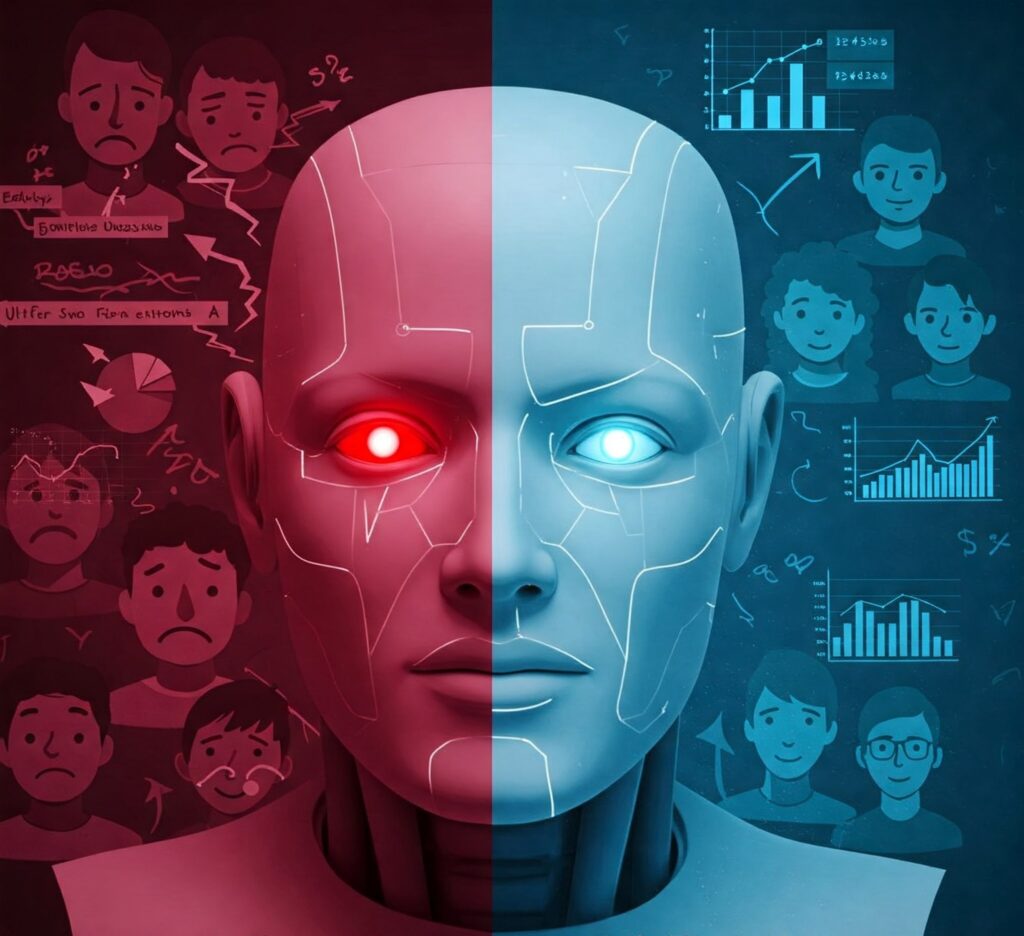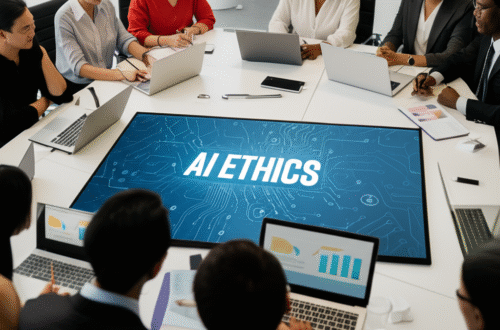Artificial Intelligence (AI) is no longer a futuristic fantasy; it’s a rapidly permeating force reshaping industries, societies, and our daily lives. As AI systems become more sophisticated and integrated into critical aspects of human existence, a crucial question arises: how do we ensure its development and deployment align with our fundamental values and ethical principles? Ethical challenges in Artificial Intelligence are not abstract philosophical debates; they are tangible dilemmas with profound societal consequences, demanding urgent attention from researchers, developers, policymakers, and the public alike.
As the European Union aptly stated in its AI Act proposal, “Artificial intelligence is a technology that holds great promise for the future, but also entails a number of potential risks.” Similarly, UNESCO’s Recommendation on the Ethics of Artificial Intelligence emphasizes the need for “a human-centred approach to AI” that prioritizes human rights, fundamental freedoms, and ethical principles. Even industry leaders like OpenAI, in their charter, acknowledge the importance of ensuring AI benefits all of humanity and actively work to mitigate potential risks. The urgency to address these ethical considerations has never been greater.
What Makes AI Ethical or Unethical?
Defining what constitutes “ethical” AI is a complex endeavor, drawing upon established ethical theories and adapting them to the unique characteristics of intelligent systems. Several core principles are frequently cited as foundational for ethical AI development and deployment:
- Fairness: AI systems should treat all individuals and groups equitably, without discrimination based on protected characteristics like race, gender, religion, or socioeconomic status. This goes beyond mere equal treatment and requires addressing systemic biases that may be embedded in data or algorithms.
- Transparency: The workings of AI systems, particularly their decision-making processes, should be understandable to humans. This principle is crucial for building trust and enabling accountability. While complete transparency may not always be feasible due to the complexity of some models, efforts towards interpretability are essential.
- Accountability: Clear lines of responsibility must be established for the design, development, deployment, and consequences of AI systems. When an AI system makes an error or causes harm, it should be possible to determine who is accountable – whether it’s the developers, deployers, or users.
- Privacy: AI systems must respect and protect individuals’ data and privacy rights. This includes ensuring data is collected, stored, and used ethically and in accordance with relevant regulations like GDPR. Anonymization and minimization of data collection are key considerations.
- Safety: AI systems should be designed and tested to ensure they operate reliably and safely, minimizing the risk of unintended harm or negative consequences. This is particularly critical in high-stakes applications like autonomous vehicles and medical diagnosis.
Ultimately, the goal is to foster human-centered AI, where the development and deployment of AI are guided by human values, prioritize human well-being, and empower individuals rather than marginalizing or harming them.
Top Ethical Challenges in AI
The rapid advancement and increasing pervasiveness of AI have brought several critical ethical challenges to the forefront:
1. Bias and Discrimination
One of the most pervasive ethical challenges in AI is its potential to reflect and amplify existing societal biases. AI systems learn from the data they are trained on, and if this data contains historical or systemic inequalities, the AI can perpetuate and even exacerbate these biases in its outputs.

Examples:
- Facial Recognition: Studies have shown that facial recognition algorithms often perform significantly worse on individuals with darker skin tones and women, leading to misidentification and potential injustices in law enforcement and security applications.
- Real-world case: In the US, facial recognition technology has been shown to disproportionately misidentify Black individuals, raising concerns about discriminatory policing.
- Recruitment Tools: AI-powered hiring tools trained on historical hiring data that underrepresented certain demographic groups may perpetuate this underrepresentation by unfairly scoring or filtering out qualified candidates from those groups.
- Real-world case: Amazon reportedly scrapped an AI recruiting tool that showed bias against women, as it was trained on historical data where male applicants dominated.
- Criminal Justice Systems: AI algorithms used in risk assessment tools for sentencing or parole decisions can perpetuate racial biases present in historical crime data, leading to unfair outcomes for minority groups.
- Real-world case: The COMPAS (Correctional Offender Management Profiling for Alternative Sanctions) algorithm used in US courts to predict recidivism has been shown to disproportionately label Black defendants as higher risk compared to white defendants with similar criminal histories.
Solutions: Addressing bias requires a multi-pronged approach, including:
- Diverse Training Data: Ensuring training datasets are representative of the population and actively mitigating underrepresentation of certain groups.
- Fairness Auditing: Regularly evaluating AI models for potential biases using specific fairness metrics and identifying disparities in outcomes across different groups.
- Bias Detection and Mitigation Tools: Developing and implementing techniques to identify and remove or reduce bias in both the data and the algorithms themselves.
2. Lack of Transparency (Black Box Problem)
Many advanced AI models, particularly deep learning networks, operate as “black boxes,” meaning their decision-making processes are opaque and difficult for humans to understand. This lack of transparency poses significant ethical challenges, especially in critical applications where understanding why an AI made a particular decision is crucial.
The explainability vs. performance trade-off often arises, where more complex and high-performing models tend to be less interpretable. However, the need for Explainable AI (XAI) is becoming increasingly recognized. XAI aims to develop techniques that can provide insights into how AI systems arrive at their conclusions, making them more understandable and trustworthy.
3. Accountability and Responsibility
As AI systems become more autonomous, the question of accountability and responsibility when they make errors or cause harm becomes increasingly complex.
Issues:
- Autonomous Vehicles: If a self-driving car causes an accident, who is responsible? The owner, the manufacturer, the software developer, or the AI itself? Current legal frameworks are often ill-equipped to handle such scenarios.
- Medical AI: If an AI-powered diagnostic tool makes an incorrect diagnosis leading to adverse patient outcomes, who is liable – the doctor who used the tool, the developers of the AI, or the hospital that deployed it?
Establishing clear legal and regulatory frameworks is essential to address these accountability gaps and ensure that there are mechanisms for redress when AI systems cause harm.
4. Privacy and Surveillance
AI’s reliance on vast amounts of data raises significant privacy and surveillance concerns. AI-powered systems are increasingly used for mass surveillance and data tracking, often without individuals’ explicit consent or full understanding.
Ethical Concerns:
- Facial Recognition and Biometric Data: The widespread deployment of facial recognition and other biometric identification technologies raises concerns about constant monitoring, potential misuse by authorities, and erosion of anonymity.
- Data Collection and Use: AI algorithms often require extensive personal data for training and operation. The collection, storage, and use of this data must adhere to ethical principles and legal frameworks like the General Data Protection Regulation (GDPR), which grants individuals rights over their data.
- Government and Corporate Surveillance: The use of AI for sophisticated surveillance by both state and private entities can lead to chilling effects on freedom of expression and association.
5. Autonomous Weapons and Military Use
The application of AI in warfare and defense raises profound ethical dilemmas. The development of autonomous weapons, capable of identifying, selecting, and engaging targets without human intervention, is a particularly contentious issue.
Ethical Debate:
- Killer Robots: Critics argue that delegating lethal decision-making authority to machines crosses a fundamental moral line and could lead to unintended escalation and a lack of accountability for civilian casualties.
- UN Calls for Regulation: The United Nations has been actively discussing the regulation of lethal autonomous weapons systems (LAWS), with many nations advocating for a ban or strict human control over their use.
6. Job Displacement and Economic Inequality
While AI promises increased productivity and economic growth, it also poses the risk of significant job displacement, particularly in sectors involving routine and manual tasks. This raises ethical questions about economic inequality and the societal responsibility to support those whose livelihoods are affected by automation.
Ethical Issues:
- Who Benefits from AI? Ensuring that the benefits of AI are distributed equitably across society, rather than concentrating wealth and power in the hands of a few.
- Role of Governments: Implementing policies for reskilling and social protections to support workers displaced by AI and facilitate their transition to new roles in the evolving economy.
7. Consent and Manipulation
AI’s ability to generate increasingly realistic content, such as deepfakes and AI-generated text and images, raises ethical concerns about consent and manipulation.
Ethical Implications:
- Influence on Elections and Opinions: AI-generated disinformation can be used to manipulate public opinion and interfere with democratic processes.
- Social Engineering and Mental Health: Sophisticated AI-powered social engineering attacks and the creation of hyper-realistic but fake online personas can exploit vulnerabilities and harm individuals’ mental well-being.
- Transparency in AI-Generated Media: Establishing clear guidelines and technologies to identify and label AI-generated content is crucial for maintaining trust and preventing deception.
Global Efforts to Address AI Ethics
Recognizing the global nature of AI’s impact, numerous international and national efforts are underway to address its ethical challenges:
- OECD AI Principles: The Organisation for Economic Co-operation and Development (OECD) has developed a set of principles promoting the responsible stewardship of trustworthy AI, emphasizing values like human rights, transparency, and accountability.
- EU AI Act: The European Union’s proposed AI Act aims to establish a legal framework for AI, categorizing AI systems based on their risk level and imposing corresponding requirements and prohibitions.
- UNESCO’s AI Ethics Guidelines: UNESCO’s Recommendation on the Ethics of Artificial Intelligence provides a comprehensive framework of ethical principles and policy recommendations for the development and deployment of AI globally.
- OpenAI Charter: OpenAI, a leading AI research organization, has its own charter outlining its commitment to ensuring AI benefits all of humanity and working towards safe and beneficial AGI.
- Private Sector Efforts: Major technology companies like Google, Microsoft, and IBM have established internal ethics boards and developed their own ethical principles and guidelines for AI development and deployment.
These diverse efforts reflect a growing global consensus on the importance of embedding ethical considerations into the fabric of AI development and governance.
How to Build Ethical AI?
Building ethical AI requires a proactive and multi-disciplinary approach throughout the entire AI lifecycle:
- Human-in-the-Loop Systems: Designing AI systems where humans retain oversight and control over critical decisions, especially in high-stakes applications.
- Fairness-Aware Machine Learning: Employing techniques to explicitly address and mitigate bias in data and algorithms, aiming for equitable outcomes across different groups.
- Open Datasets and Audit Trails: Promoting the use of transparent and well-documented datasets and maintaining audit trails of AI system decisions to facilitate accountability and identify potential issues.
- Algorithmic Impact Assessments: Conducting thorough assessments of the potential societal and ethical impacts of AI systems before their deployment.
- Importance of Interdisciplinary Teams: Fostering collaboration between AI developers, ethicists, legal experts, social scientists, and domain experts to address the complex ethical dimensions of AI.
The Future of AI Ethics
As AI continues to advance, new and complex ethical challenges will emerge:
- Artificial General Intelligence (AGI): The development of AI with human-level intelligence could raise unprecedented ethical questions about the rights and status of such systems.
- Synthetic Biology + AI: The convergence of AI with other emerging technologies like synthetic biology could create novel ethical dilemmas.
- Emotional AI: The development of AI systems capable of recognizing and responding to human emotions raises questions about manipulation, privacy, and the nature of human-machine relationships.
Ethical design principles and frameworks must evolve in tandem with these technological advancements. This necessitates global cooperation and inclusive debate involving diverse stakeholders to anticipate and address these future challenges effectively.
Conclusion
The ethical challenges in Artificial Intelligence are not merely theoretical concerns; they are fundamental issues that will shape the future of our societies. Building ethical AI is not optional – it is essential for ensuring that this powerful technology serves humanity’s best interests and aligns with our core values. This requires continuous dialogue, the development of robust regulations and guidelines, and a commitment to education and awareness. The call to action is clear: we must develop AI with purpose, responsibility, and a deep commitment to human values, ensuring a future where artificial intelligence empowers and benefits all of humanity.





